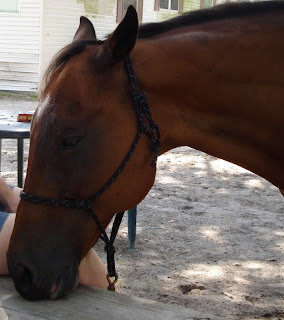Look Mom, No Cavities!
August 24, 2012
Did you know that domestic horses need regular dental check
ups? A combination of factors, including how a horse chews his food and the way
a horse’s teeth continue to erupt through the gum during his lifetime, can create
sharp edges or hooks that can actually cut his cheeks and tongue, affecting
his eating and making it painful to be ridden with a bit in his mouth. Properly
cared for teeth help the horse chew feed more effectively—he won’t drop as
much, and there won’t be a build-up of improperly chewed food in his stomach
that could cause impaction colic. Veterinarians often perform horse dental
work, and there are also specialized equine dentists. They generally recommend
dental check ups every six months to a year, depending on the horse’s needs.
When a vet or equine dentist takes off those sharp edges
with a file, it’s called “floating” the teeth. This used to be done with a hand
tool that looks like a large file (called a “float”), but many vets and equine
dentists now use a power file with a diamond head—much easier on both vet and
horse. The vet or equine dentist also inspects the mouth, teeth and gums for
any abnormalities such as an abscess, broken or cracked teeth or even gum
disease! Horses can also get cavities and need to have teeth pulled, just like
humans. (As far as I know, brushing a horse’s teeth is not a common practice,
however!)
As you might expect, horses do not generally like to have
their mouths held open while a buzzing electric drill files down their molars.
To float a horse’s teeth, he must be sedated. The vet/dentist uses a special
halter and mouth speculum that holds the horse’s head up and his mouth open.
 |
| Hey, that's my tongue! |
Last week, we had a visit from Advanced Equine Dentistry. Dr. Jay Clifford is a vet, and Richard Grist, CEqD is an equine dentist. They’re both very nice and easy to work with,
so we always like seeing them. Tank is a good patient and is on a maintenance
program, so it takes less than a half hour for him to board the rig, be
sedated, have his teeth floated and be back out and waking up. (He always looks
a little pathetic as the sedation wears off.) After an hour or so, I let him
graze a bit before he goes back out with his buddies.
 |
| Zzzzzz... |
So that’s your horse care lesson for the week, and Tank’s
everyday adventure. Oh, and he got a clean bill of dental health!
 |
| Back to normal. |





.jpg)



4 comments
Yay for no cavities! Way to go, Tank, and don't feel too bad...I'm not crazy about the dentist either!
ReplyDeleteI'm not either--sometimes I wish they'd sedate me like they do Tank!
ReplyDeleteYou take such good care of Tank - he's lucky to have you as his owner. And I'm with you - I don't like the dentist much either!
ReplyDeleteTank is pretty spoiled, but he's such a nice guy that he doesn't take advantage. I'm all for preventative care, too, as that seems to keep them healthier longer.
ReplyDeleteI don't know anyone who likes the dentist...I kind of feel sorry for them, now!